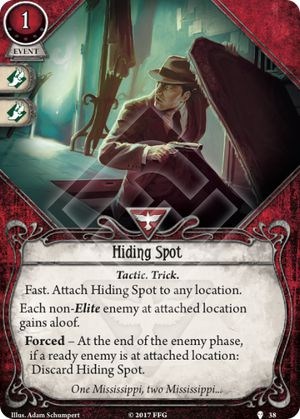Probably the best Investigator in the game to use this card would be Wendy Adams. Wendy's Amulet allows her to recur events from the discard pile. Due to the wording of her amulet, Events that end up attaching to locations do not end up going to the discard pile (and, therefore, do not end up going to the bottom of her deck).
When Hiding Spot would expire at the End of the Enemy Phase as a result of a ready enemy being at an attached location, Hiding Spot would be discarded straight to the top of the discard pile. There's a Player Action window at the start of the Upkeep Phase that allows Wendy to use the Amulet's ability to play Hiding Spot out again to a location.
Unfortunately, that small gap in time allows any enemies at a location to immediately engage with any Investigators there (and playing Hiding Spot does not cause them to dis-engage, they just gain Aloof). However, playing Hiding Spot to the same location will help keep out MORE enemies drawn from the Encounter Deck, while your team deals with the enemies currently on them.
